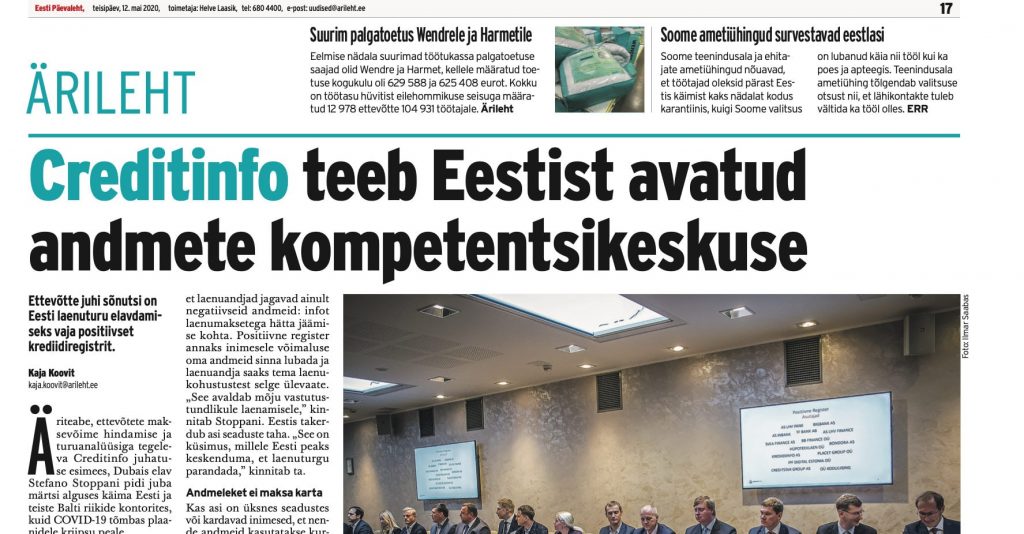Kredītinformācijas Birojs – KIB (Credit Information Bureau) unveils new scorecard for consumers

After intense work that lasted the past several months, Kredītinformācijas Birojs finally introduced a new statistical model that forecasts the borrower’s credit risk, last month. The new credit rating predicts the probability that a borrower will default on their credit obligations for more than 60 days in the next 12 months, with the amount of obligation being at least EUR 150.
Proactive Portfolio Management

The world is currently facing unprecedented economic challenges resulting from the COVID-19 pandemic. This was initially reflected in drops in oil prices, followed by the falling stock market and more recently employment levels. Research by the UN suggests global GDP is likely to shrink by around one per cent this year and could contract further if restrictions on economic activity extend beyond the second quarter.
Thanks to Creditinfo, Estonia becomes the competence center of open banking

The Head of the company says a positive credit register is needed for boosting the Estonian credit market. Stefano Stoppani, Dubai-based Chairman of the Board of Creditinfo providing business information, solvency assessment and market analysis, intended to visit its offices in Estonia and the other Baltic countries in the beginning of March, but COVID-19 hampered with these plans. Europe is cautious in regulating both data protection and open banking. The aim of the PSD2 directive is to give third parties – licensed companies – access to a person’s bank account information. This is not done just because, but for providing better service, and obviously the account holder must authorize this. The third-party, for example, the creditor, can then see the income of the person and what the money is spent on. Information is needed to determine if the person is able to pay back the loan (s)he wants.
Creditinfo’s commitment to Data Quality

Data is the new oil, but quality is paramount
In 2017, The Economist ran a cover story portraying data as the new oil, (certainly not last week’s oil), calling it “the world’s most valuable resource”. Data is pervasive and is collected regarding virtually everything that happens. Essentially it comes down to one simple cycle, as described in that 2017 issue: “By collecting more data, a firm has more scope to improve its products, which attracts more users, generating even more data, and so on…” Information is power (for credit bureaus, the power to enhance market lending effectiveness). But there is a catch; because not any kind of data will suffice. In the world of credit, for it to be valuable, data must be complete, high quality, regularly transmitted and verifiable. High-quality data has a deeper, more transformative power. In this industry, data quality and completeness are critical for the successful impact of credit bureaus, and Creditinfo has, since its founding, had a clear focus on this area to support banks, MFIs and other institutions for constant improvement.
New “Creditinfo CO” system reports on debtors’ debtors

Press Release
April 28, 2020. Creditinfo Lithuania today introduced the new debtor reporting system “Creditinfo CO”. The system will give businesses the ability to learn, free of charge and in one place, how many companies are late with payments to their debtors and for what total amount starting from lock down period caused by COVID-19. The aim is to provide businesses with useful information that can help them make decisions on a more informed basis – whether to negotiate with debtors on payment terms, prepare documents for an assignment of debt, or initiate a judicial recovery process. It is also worthwhile checking what length deferments and what size trade credits are being granted to business partners.
Keep an eye on Partners’ Payments, Lithuanian experts advise

The current situation in Lithuania compels businesses to regard its partners with a deeper mistrust. The enterprises face challenges of their survival – how to ensure the continuity of activities, reorientate its services, and not lose the clients. Even those businesses which have a sufficient number of clients, feel worried about whether their partners are still trustworthy and will make payments on time.
Digitalization Helps Lenders Overcome Challenges Caused By COVID-19

The rapid spread of the Coronavirus is impacting economic growth and market volatility is increasing thus impacting the industry through weakening investment returns and potentially adverse impact on the capital position of financial institutions around the world. A sustained economic slowdown triggered by the outbreak will put negative pressure on revenues and lead to a material increase in credit risk and a potential spike in claims including for health, credit and event cancellation insurance.
Trusting Creditinfo Bureau Score in a Crisis

The quality of predictive algorithms plays a crucial role in Creditinfo operations. We strive to help our Clients perform efficient credit decisions through smart and innovative use of data.
How alternative data can help unbanked population acquire traditional loans

By Dmitry Borodin, Head of Risk Analytics at Creditinfo Group
In societies of Digital Nomads, working from home Millennials, global migrations and emerging economies, lenders are often facing a shortage of relevant data to score and assess a big pool of population. Consequently, lenders are often unable to make decisions on so called ‘thin files’ due to a lack data. Thin file customers then remain excluded from formal finance.
Creditinfo and PT PEFINDO Biro Kredit Sign Long-Term Strategic Partnership Agreement in Indonesia

PRESS RELEASE
Creditinfo Group, the leading global credit information and fintech services provider has today announced that it has signed a long-term strategic partnership agreement with PT PEFINDO Biro Kredit (PBK) to further support financial and non-financial institutions in Indonesia. Using Creditinfo’s knowledge and experience, PBK will enhance its consultancy and analytical services to provide customers with additional value-added risk management solutions and support.




